How African gamers are taking over esports
As African gamers compete evermore internationally, we shadow East Africa’s first female pro gamer at a tournament
It could be a warehouse rave. Booming EDM shakes the walls, while circular spotlights and pixel lights shine a kaleidoscope of colours across a dark hall. But the hundreds of young people streaming into the plush hall at the Eko Convention Centre in Lagos are there for a more serious business: to play some video games.
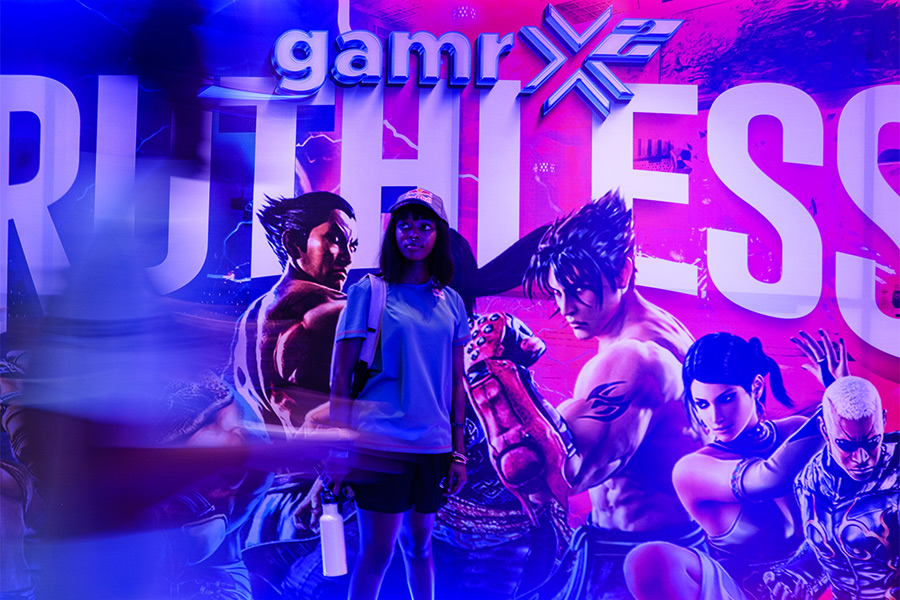
QueenArrow gearing up for combat / Image: Jean-Fidele Ananou

For the professional gamers attending today, 7.5 million naira (US$9,800) is up for grabs. Lit by neon-purple light, a young woman dressed in a Red Bull cap focuses her gaze. Digitalised martial artists bounce rhythmically on the screen that glows in front of her, preparing for battle. Sylvia Gathoni – an up-and-coming esports athlete known in gaming circles as QueenArrow – is preparing to play a final round of Tekken 7 against one of Africa’s most decorated fighting game champions, General Zod.
Not long ago, this all would have been an impossible dream. Although gaming has been a part of the social fabric in Nigeria, and across Africa, for decades, gamers never had a place to compete – until now. Taking place on 17 June, 2023, this is the second edition of Gamr X, Africa’s largest esports tournament and a game changer for aspiring esports athletes from Lagos and beyond. Scores of competitors huddle together playing games on consoles and mobile phones. A large screen projects the most popular games to a captive audience, with live commentary rising over the sound of their cheers.

A serious business / Image: Mia Collis

Video games are as popular here as anywhere else across the globe, but this subculture has long been left behind in African countries. In Europe, North America, China and South Korea, gaming is an established competitive sport that’s growing rapidly – with the global esports market estimated to be worth almost US$3bn by 2025. Gaming is the world’s highest-grossing entertainment industry, making more than music and film combined.
Africa’s gaming market is growing at an annual rate of 12%. But African gamers face challenges that are barely on the radar for players in other parts of the world. Game servers, which host online games and (along with a strong internet connection) are responsible for smooth streaming during a game, are painfully scarce. Internet connectivity is patchy across the continent. Both are crucial for taking part in international competitions, yet South Africa is the only African country that has a server.
“Gaming is becoming a more valid and respected career path. Young people are starting to see the kinds of doors it can open for them”
And while broadband connectivity is improving in general, only around 36% of Africans currently have access to the internet. As a consequence, African gamers often don’t have the connectivity required to compete internationally, and have to travel outside the continent to participate in competitions. The prohibitive cost of overseas travel means that playing professionally in esports feels like a fairy tale for most African gamers. Meanwhile, gaming champions in North America can earn millions of dollars per year, even outpacing pro cyclists, golfers and wrestlers – swapping clubs and bikes for consoles and computers.
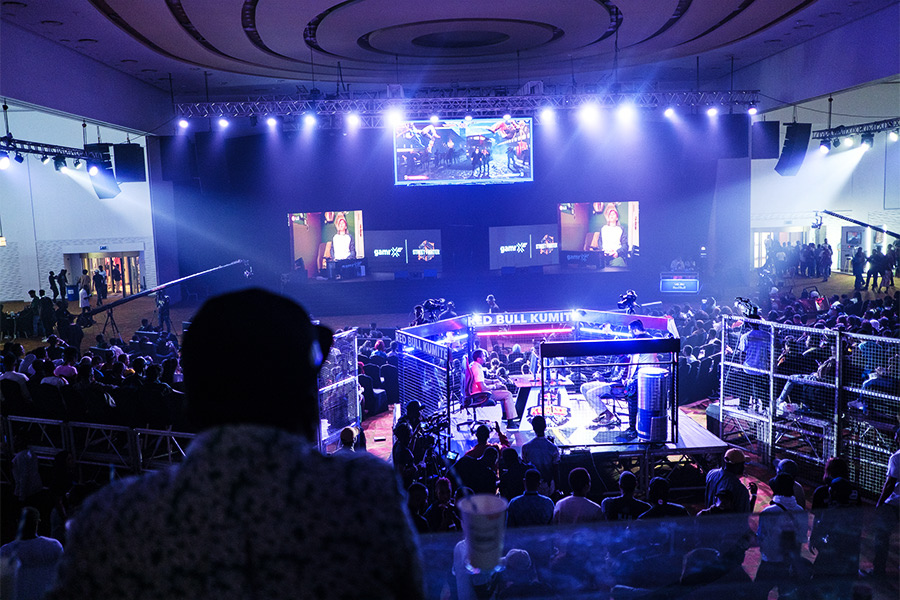
Surveying the scene at Gamr X / Image: Jean-Fidele Ananou

But change is here. Events like Gamr X, as well as the World Connected Series – a competition hosted by the Singapore-based Global Esports Federation in Lagos for Sub-Saharan competitors – are creating new avenues for African gamers to compete among themselves. “Gaming has been in existence for a long time but it has not been perceived as ‘cool’. So for us, revolutionising that negatively perceived culture of gaming and esports is important,” says Eniola Edun, CEO of Gamr, the parent company of Gamr X.
A gamer herself, Edun left her tech company job to build the infrastructure needed for a pan-African gaming tournament, alongside co-founders Seyi Fakoya and Kunmi Adenipebi. When Covid-19 hit in 2020, an opportunity for Africa’s fledging gaming and esports industry arose among the chaos. As young people turned to online gaming for entertainment and socialising, the foundations were laid for Gamr X.
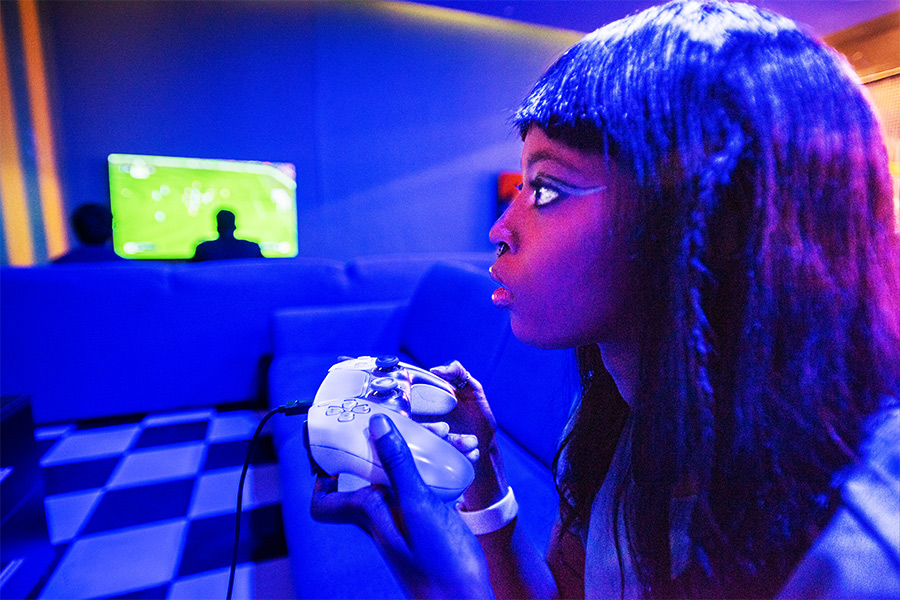
Game face on / Image: Mia Collis

The stereotype of gaming as a male pursuit – which persists around the world – is alive and well in Africa, too. Due to social norms and discrimination, female gamers can face even more obstacles, but Edun is dedicated to creating a space for equality with Gamr X. “This generation, we are bullish, we will stand up for what we want,” she says.
For Gathoni, gamers are gamers, no matter their real-world identity. Having played video games since the age of three, she is Kenya’s first female pro gamer and the first female player in East Africa to get a global brand endorsement – from video game developer Exit Games. Add to the fact that Gathoni was the first Kenyan esports athlete to feature on Forbes magazine’s 30 Under 30 list, and the first Red Bull athlete in Kenya, and it’s no surprise that she’s aiming for the top. That’s when she’s not studying for her law degree in her home city, Nairobi.
“My body of work speaks for itself,” she says. “I soon hope to be one of the best Tekken players in the world – not just in Africa. I want to show that esports is for everybody, regardless of where you’re from, your gender or your race.”
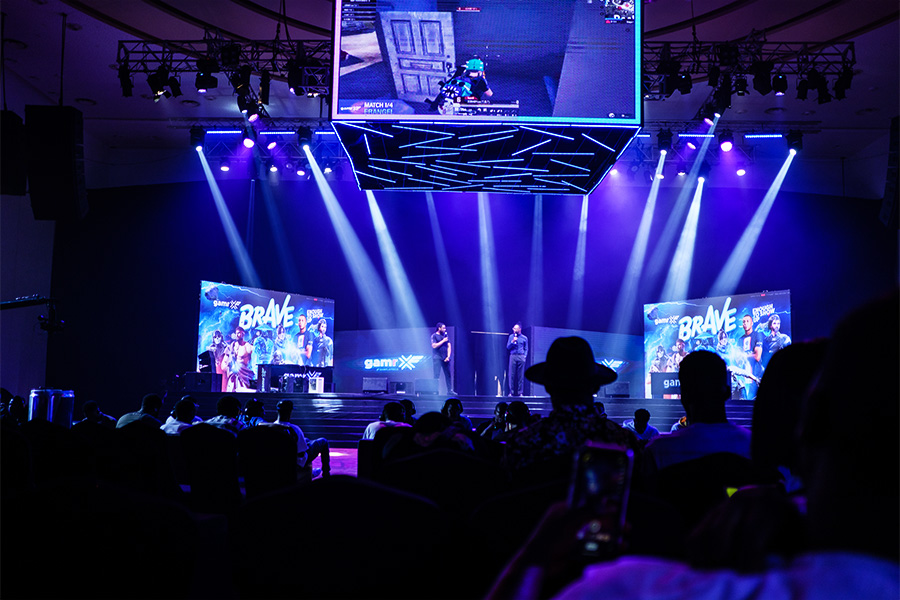
Taking the stage / Image: Jean-Fidele Ananou

She launches into a King-of-the-Hill tournament where five other competitors – all men – fight against each other to play against her in the final set. Watching it play out, Gathoni exudes optimism about the future of esports in Africa.
“Having this kind of tournament is a dream come true,” she says. “Gaming is becoming a more valid and respected career path, in Nairobi, Lagos, Johannesburg, Cape Town. Young people are starting to see the kinds of doors it can open for them.
“My generation is looking for more fulfilling career paths that don’t necessarily mean 9-5. As long as gaming and esports make people happy, I don’t see what the harm is in letting people decide what path is best for them.”
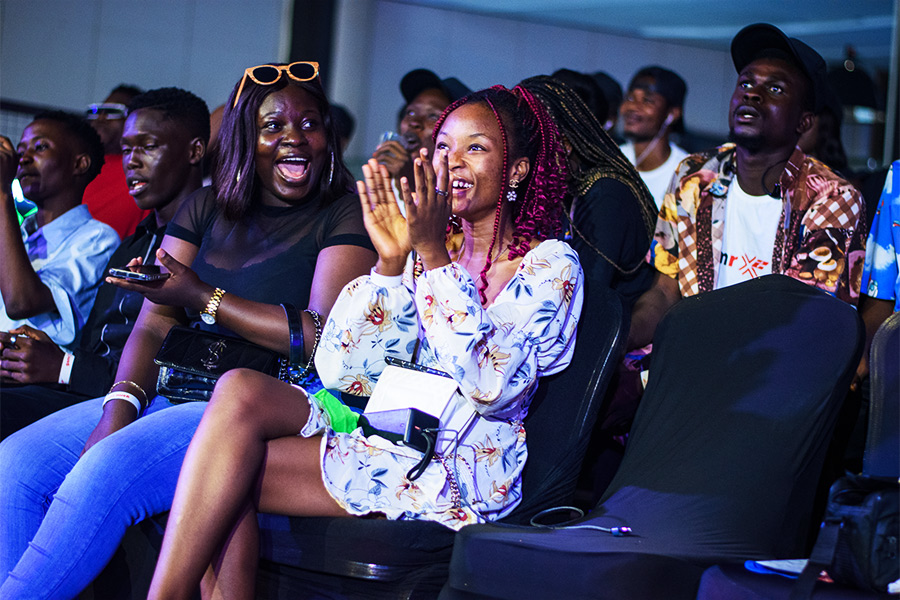
Like any good sports tournament, an enthusiastic crowd is key / Image: Jean-Fidele Ananou

When it comes to esports, Africa is getting closer to standing shoulder-to-shoulder with the rest of the world. While the lack of servers remains a major problem, game developers and tournament organisers are proving that a large, thriving community of gamers exists on the continent. It’s a vital step towards Africa becoming an essential part of the global esports ecosystem.
“When esports becomes culturally accepted, it is very easy to build infrastructure around that… getting investors, getting sponsors, getting companies to put their eyes on it,” explains Dominion Eromosele, senior community manager at Carry1st, a South Africa-based games developer.
“I hope to see proper African representation in character design and backgrounds, to prove that Africa is equal within the esports scene”
For Eromosele, the future of gaming in Africa is playing out on smartphones. The trajectory of mobile gamers there is skyrocketing. In 2015, there were 77 million gamers in Sub-Saharan Africa. By 2021, the number had more than doubled, hitting 186 million.
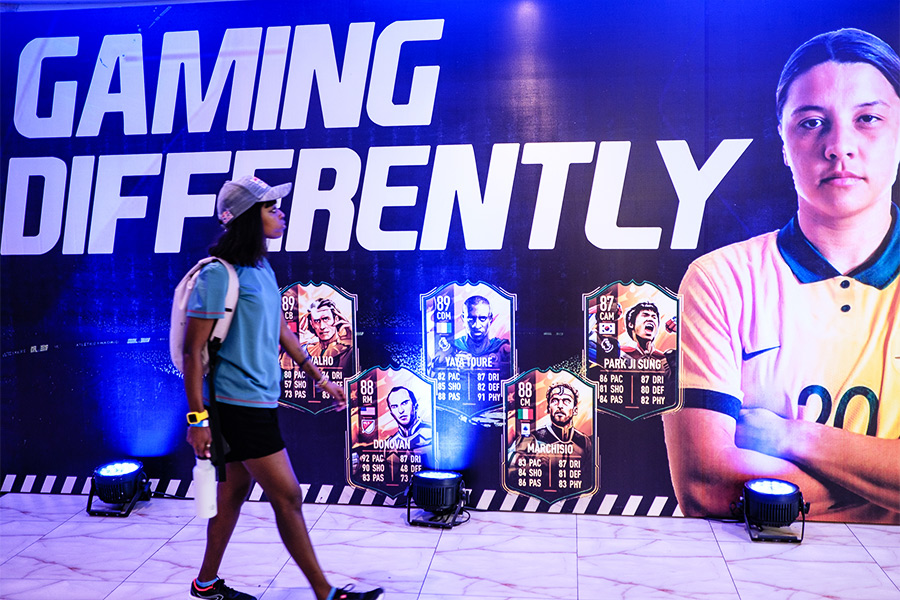
Queen Arrow/Image: Jean-Fidele Ananou

Now, 95% of African gamers play on their smartphones. Around the world, mobile games accounted for more than half of the global gaming market in 2022 and it is estimated that it will bring in US$235bn in revenue by 2030.
With the rise of smartphones, tablets, high-speed internet and faster download speeds, mobile games are only becoming more sophisticated and accessible. In Africa, at least 13 countries now have internet speeds of over 25 megabits per second (mbps), opening up a world of online meetings, on-demand videos, music streaming and of course, gaming.
“Africa is largely mobile-first and the good thing about that is we can build games and esporting culture all through the mobile-first approach,” says Eromosele. “Plus, due to the lower-resolution graphics, players on mobile phones in Africa can interact better with international players than their counterparts playing on consoles.”

QueenArrow shooting for victory / Image: Mia Collis
So what is the next step when it comes to the local gaming scene? It’s all about African representation within video games, as well as in esports tournaments. “I hope to see proper African representation in character design and backgrounds, to prove that Africa is equal within the esports scene,” says Gathoni. “Japanese developers have gone out of their way to include African players in tournaments like the Tekken World Tour and Capcom Pro Tour. Next, I hope to see that representation in the games that we play.”
Prefer your sports in 3D? Read about women’s basketball in Africa.